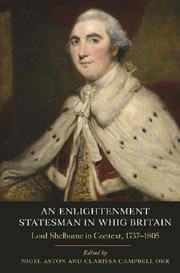Book contents
- Frontmatter
- Contents
- List of Illustrations
- List of Contributors
- Acknowledgements
- List of Abbreviations
- Introduction
- Part One Family, Piety, and Finance
- 1 Petty and Fitzmaurice: Lord Shelburne and his Brother
- 2 Aunts, Wives, Courtiers: The Ladies of Bowood
- 3 A Christian Whig: Lord Shelburne and the Latitudinarian Tradition
- 4 Lord Shelburne, Finance, and Sir Francis Baring
- Part Two Politics
- Part Three The Bowood Circle Revisited
- Index
- STUDIES IN EARLY MODERN CULTURAL, POLITICAL AND SOCIAL HISTORY
4 - Lord Shelburne, Finance, and Sir Francis Baring
from Part One - Family, Piety, and Finance
Published online by Cambridge University Press: 05 September 2013
- Frontmatter
- Contents
- List of Illustrations
- List of Contributors
- Acknowledgements
- List of Abbreviations
- Introduction
- Part One Family, Piety, and Finance
- 1 Petty and Fitzmaurice: Lord Shelburne and his Brother
- 2 Aunts, Wives, Courtiers: The Ladies of Bowood
- 3 A Christian Whig: Lord Shelburne and the Latitudinarian Tradition
- 4 Lord Shelburne, Finance, and Sir Francis Baring
- Part Two Politics
- Part Three The Bowood Circle Revisited
- Index
- STUDIES IN EARLY MODERN CULTURAL, POLITICAL AND SOCIAL HISTORY
Summary
The personal associations of politicians and bankers, while pregnant with potential for historians, have been remarkably little explored. This is not altogether surprising as their essence was informality and discretion, so consequently they are poorly documented and hard to pin down. They were probably at their most intense in the eighteenth and early nineteenth centuries when banking was in the hands of private bankers acting in small partnerships and controlling their own capital. In charge of his destiny and possessing flexibility and discretion, the private banker was well placed to form associations with men of influence. Such relationships were not easily replicated in the era of joint stock banking which overhauled private banking as the nineteenth century progressed; here relationships were more rigid and formulaic.
The relationship between politician and private banker was at its most complex, potent, and durable in the arena of merchant banking. The private merchant banker long outlived his high street equivalent and survived until well into the twentieth century. He had his origins in international merchanting, trading in commodities, and corresponding with a network of trusted merchant houses in trading centres around the world. The most successful and powerful merchants added trade finance – that is, financing the trade of other merchants – to their activities and emerged as merchant bankers. It was a short step from this to financing governments, businesses and individuals, either through loans or trade finance, or, increasingly from the late eighteenth century, by buying up and/or distributing bonds of governments and, later, businesses, in need of finance.
- Type
- Chapter
- Information
- An Enlightenment Statesman in Whig BritainLord Shelburne in Context, 1737–1805, pp. 97 - 114Publisher: Boydell & BrewerPrint publication year: 2011

